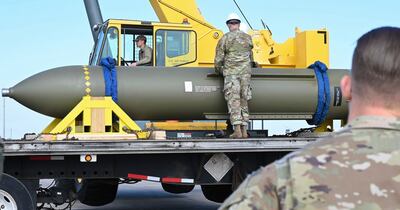The number of Israeli strikes on Iranian targets in Syria has doubled since the current government took office at the end of last year, Israel's Defence Minister Yoav Gallant has said.
These aim to damage Iran's intelligence capabilities and prevent its Islamic Revolutionary Guard Corps from becoming established near the border with Israel, Mr Gallant told a security conference on Monday.
Mr Gallant did not say how many strikes have been conducted this year, in what were rare comments on Israeli military activity in Syria.
“Since I took office, the number of Israeli strikes against the Iranians in Syria have doubled,” he said.
“As part of this campaign, we are working methodically to strike the Iranian intelligence capabilities in Syria.
"These strikes inflict significant damage to the attempts by the Revolutionary Guard to establish a foothold a few kilometres from the Israeli border.”
The security conference, organised by the Institute for Policy and Strategy of Reichman University, also heard from Israel's military chief, Lt Gen Herzi Halevi, who warned on Tuesday that "negative events" in Iran's nuclear programme could "prompt action" from Israel.
Lt Gen Halevi also said that his country's options in the event of a confrontation with Iran "are good".

"We need to strengthen them more so that we can carry out a broad campaign against Iran,” he added.
His warnings came after The Associated Press said that a new nuclear facility in Iran's Zagros Mountains might be too deep for a special US bomb to penetrate.
The GBU-57 bunker-buster weapon, also known as the Massive Ordnance Penetrator, can penetrate 60 metres into the ground before detonation, according to the US military.
The US and Israel have previously said they would not allow Iran to create a nuclear weapon.
On Monday, Mr Gallant also accused Iran of converting civilian ships into military vessels armed with weapons such as drones, missiles and intelligence-gathering capabilities.
He said Tehran hopes to station these ships at long distances from Iran.
“Iran aims to expand its reach to the Indian Ocean, the Red Sea and even the shores of the Mediterranean,” he said.
"This is a structured plan designed to threaten trade and flight routes – both military and civilian – and to create a permanent threat in the maritime arena.”
Mr Gallant's comments came the same day that the head of Israel's military intelligence said that an emboldened Hezbollah, a Lebanese terror organisation widely viewed as an Iranian proxy, risks sparking a regional conflict.
Aharon Haliva said chances of a serious escalation between Israel and Hezbollah "are not low".
In April, Israel accused a faction of the Palestinian militant organisation Hamas based in Lebanon of firing rockets into Israeli territory.
Israel responded with strikes in southern Lebanon and the Gaza Strip.
Iran is considered by Israel to be its greatest enemy, as it often calls for Israel's destruction and supports extremist groups across the region.
It also accuses Iran of trying to develop a nuclear bomb. Iran denies this, saying its nuclear programme is for peaceful purposes.
Israeli officials have acknowledged carrying out hundreds of strikes against Iranian targets in Syria, where Iran has sent advisers and forces to assist President Bashar Assad in the country's 12-year civil war.
But officials have given few details over the years and almost never comment on specific operations.
The far-right Israeli coalition government headed by Prime Minister Benjamin Netanyahu took office in December 2022.
Hardline ministers in Mr Netanyahu's coalition have previously voiced anger at the Prime Minister over what they perceive to be his weak response to security threats.
Earlier in May, far-right National Security Minister Itamar Ben-Gvir boycotted a weekly cabinet meeting over "unacceptable" decisions and called on Mr Netanyahu to "shift to a fully right-wing policy".
Agencies contributed to this report

